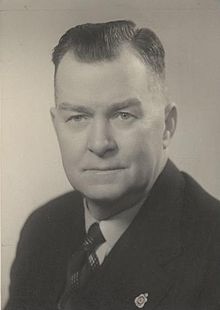George Bowden (Australian politician)
|
George Bowden MC |
|
|---|---|
 |
|
| Member of the Australian Parliament for Gippsland |
|
|
In office 21 August 1943 – 2 November 1961 |
|
| Preceded by | Thomas Paterson |
| Succeeded by | Peter Nixon |
| Personal details | |
| Born |
17 March 1888 Moyhu, Victoria |
| Died | 8 June 1962 (aged 74) Heidelberg, Victoria |
| Nationality | Australian |
| Political party | Australian Country Party |
| Occupation | Farmer |
George James Bowden MC (17 March 1888 – 8 June 1962) was an Australian soldier and politician.
Bowden was born at Moyhu, Victoria to farmer William Henry Bowden and Catherine Christina, née McCalman. He attended the Whitfield and Benalla state schools before becoming a commission agent. He enlisted in the Australian Imperial Force on 6 March 1915, in which he rose to captain by 1918. Wounded at Gallipoli and the Western Front (where he was also gassed), Bowden was awarded the Military Cross in 1918 with particular reference to his daring at the Battle of Mont St Quentin.
On his return to Australia in 1919, Bowden farmed at Koo Wee Rup in Gippsland. He joined the Country Party in 1923, was elected to Cranbourne Shire Council in 1928 (serving until 1938) and was an unsuccessful candidate for the Victorian Legislative Assembly seat of Mornington in 1935 and 1937. In the conflict between the Victorian and federal branches of the Country Party over John McEwen's decision to support the United Australia Party Government, Bowden was a staunch supporter of McEwen; he also supported Albert Hocking against Premier Sir Albert Dunstan in a dispute over the attempts by the executive to influence the State party.
...
Wikipedia
